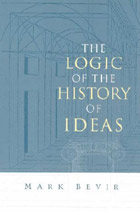Author's response
| Book: | The Logic of the History of IdeasMark BevirCambridge University Press, 1999 ISBN 0 521 64034 2 (Hdbk.). £37.50, $59.95 |
| Reviewer: | Professor Alun MunslowUniversity of Staffordshire |
Professor Munslow's account of The Logic of the History of Ideas niggles me in many little ways. To list them all would be tedious, and yet I cannot think of a way of bringing them under one or two headings. What then to discuss here? How about this - Munslow suggests, all and sundry will point to the flaw in my argument being the account of meaning as intention.
While I do equate meaning with intention, it is important to grasp what I mean by intention. In The Logic of the History of Ideas, I reject a strong intentionalism in which intentions are prior purposes. Instead, I adopt a weak intentionalism in which the concept of the intentional indicates that an object is entangled with a mind, and I am careful to avoid a commitment to any particular analysis of mind. (Cf. "Intentional . . . 3. Schol. Philos. Pertaining to the operations of the mind; mental; existing in or for the mind." [Shorter OED]). Thus, my equation of meaning with intention implies only that meanings are in or for the mind. I equate meaning with intention primarily to defend a procedural individualism according to which meanings exist only for specific individuals.
Why does Munslow consider weak intentionalism flawed? He says knowing an author's intentions need not help us understand a text. But this seems irrelevant. Weak intentionalism does not equate meanings solely with authorial intentions. All procedural individualism implies is that texts only mean things for specific people, whether they be authors, readers, or us.
Munslow says utterances can be made without expressing intentions. But this too seems irrelevant. Weak intentionalism implies utterances acquire meaning only through the intentional or mental activity of particular individuals. Suppose an utterance is made without expressing an intention. Surely to acquire meaning it still has to be understood in some way through the intentional or mental activity of individuals? Or at least surely this is so unless we ascribe innate meanings to utterances independent of all people?
Finally, Munslow says unless we postulate such innate meanings - which, like me, he does not want to - we must make up meanings; to say X means Y is to make an educated guess since we cannot have any pure experience of the past. But this too seems irrelevant. When we postulate past actions, past trade patterns, or anything else, we make educated guesses, but we do not consequently deny the validity of historians thinking in terms of actions or trade patterns. Why, then, should we do so in the case of intentional meanings?
Although Munslow mentions my rejection of strong intentionalism for weak intentionalism, his criticisms of The Logic of the History of Ideas rely on falsely attributing the former to me. To overturn my weak intentionalism, a critic would have at least either to point to where my reasoning goes awry or to provide a compelling account of a type of historical meaning that is neither a meaning for individuals nor an abstraction based thereon. In the absence of such criticism, I will continue on my way. Maybe that way is the middle of the road, maybe it is an obscure byway; whatever, travelling along it certainly feels like the slow, cumbersome hacking of a path through dense undergrowth. If your wanderings bring you near, do not hurry past, stop for a chat about how we got here and where we might go.
March 2001

